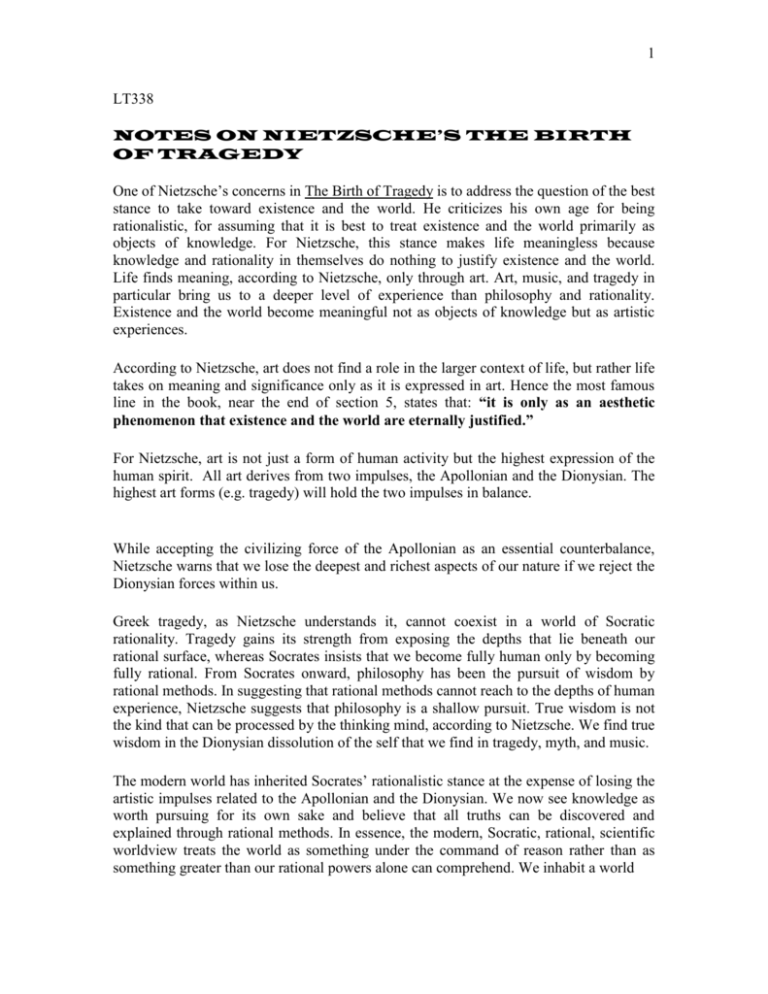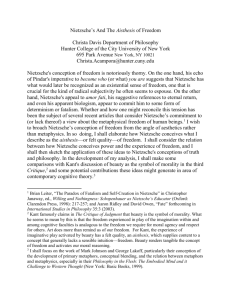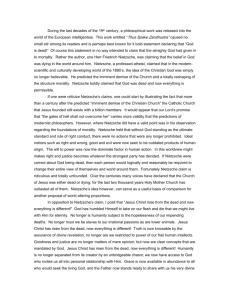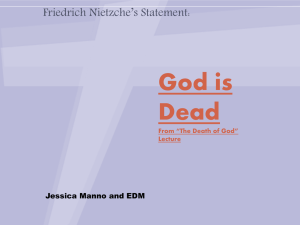LT338
advertisement

1 LT338 NOTES ON NIETZSCHE’S THE BIRTH OF TRAGEDY One of Nietzsche’s concerns in The Birth of Tragedy is to address the question of the best stance to take toward existence and the world. He criticizes his own age for being rationalistic, for assuming that it is best to treat existence and the world primarily as objects of knowledge. For Nietzsche, this stance makes life meaningless because knowledge and rationality in themselves do nothing to justify existence and the world. Life finds meaning, according to Nietzsche, only through art. Art, music, and tragedy in particular bring us to a deeper level of experience than philosophy and rationality. Existence and the world become meaningful not as objects of knowledge but as artistic experiences. According to Nietzsche, art does not find a role in the larger context of life, but rather life takes on meaning and significance only as it is expressed in art. Hence the most famous line in the book, near the end of section 5, states that: “it is only as an aesthetic phenomenon that existence and the world are eternally justified.” For Nietzsche, art is not just a form of human activity but the highest expression of the human spirit. All art derives from two impulses, the Apollonian and the Dionysian. The highest art forms (e.g. tragedy) will hold the two impulses in balance. While accepting the civilizing force of the Apollonian as an essential counterbalance, Nietzsche warns that we lose the deepest and richest aspects of our nature if we reject the Dionysian forces within us. Greek tragedy, as Nietzsche understands it, cannot coexist in a world of Socratic rationality. Tragedy gains its strength from exposing the depths that lie beneath our rational surface, whereas Socrates insists that we become fully human only by becoming fully rational. From Socrates onward, philosophy has been the pursuit of wisdom by rational methods. In suggesting that rational methods cannot reach to the depths of human experience, Nietzsche suggests that philosophy is a shallow pursuit. True wisdom is not the kind that can be processed by the thinking mind, according to Nietzsche. We find true wisdom in the Dionysian dissolution of the self that we find in tragedy, myth, and music. The modern world has inherited Socrates’ rationalistic stance at the expense of losing the artistic impulses related to the Apollonian and the Dionysian. We now see knowledge as worth pursuing for its own sake and believe that all truths can be discovered and explained through rational methods. In essence, the modern, Socratic, rational, scientific worldview treats the world as something under the command of reason rather than as something greater than our rational powers alone can comprehend. We inhabit a world 2 dominated by words and logic, which can only touch the surface of things, while shunning the tragic world of music and drama, which cuts to the ‘ground of being.’ According to Nietzsche, Socrates effectively invented Western rationality, insisting that there must be reasons to justify everything. He was ‘the one turning point and vortex of so-called world history.’ Socrates was the type of ‘theoretical man’, valuing consciousness and devaluing instinct. He interpreted instinct as a lack of insight and wrongdoing as a lack of knowledge. By making the world seem knowable and all truths justifiable, Socrates gave birth to the scientific worldview. Under Socrates’ influence, Greek tragedy was debased and the chief offender was Euripides – a ‘mask’ of Socrates. Euripides shuns both the primal unity induced by the Dionysian and the dreamlike state induced by the Apollonian, and instead he turns the Greek stage into a platform for morality and rationality. Rather than present tragic heroes, Euripides gave his characters the foibles of ordinary human beings. He introduced ‘mundane naturalism’ and sophistical dialectic; these stage the mediocrity of ordinary life, cutting tragedy adrift from the fated grandeur of myth. Nietzsche argues that we have no direct understanding of myth anymore, but we always mediate the power of myth through various rationalistic concepts, such as morality, justice and history. So far, the tremendous influence of Greek culture has done very little to shift our own culture’s opposition to art because we tend to interpret the Greeks according to our own standards and read tragedies as expressions of moral, rational forces rather than expressions of the mythic forces of the Apollonian and the Dionysian. Myth gives us a sense of wonder and a fullness of life that our present culture lacks. Nietzsche urges a reconnection to ‘the ground of being’ which is expressed in myth, music, and tragedy. The only way to rescue modern culture from self-destruction is to resuscitate the spirit of tragedy. Nietzsche sees hope in the figure of Richard Wagner, who is the first modern composer to create music that expresses the deepest urges of the human will. Nietzsche met Wagner as a young man and Wagner impressed his own views about life and art on Nietzsche. The Birth of Tragedy is, in many ways, a philosophical justification for Wagner’s operas. Over the course of the 1870s Nietzsche became increasingly disgusted with Wagner’s shallow pro-German nationalism and his anti-Semitism. The Birth of Tragedy, however, is deeply imbued with Wagner’s influence. It expresses Nietzsche’s youthful hope that a purified German culture can rescue European civilization from the decadent influence of Socratic rationalism. 3








